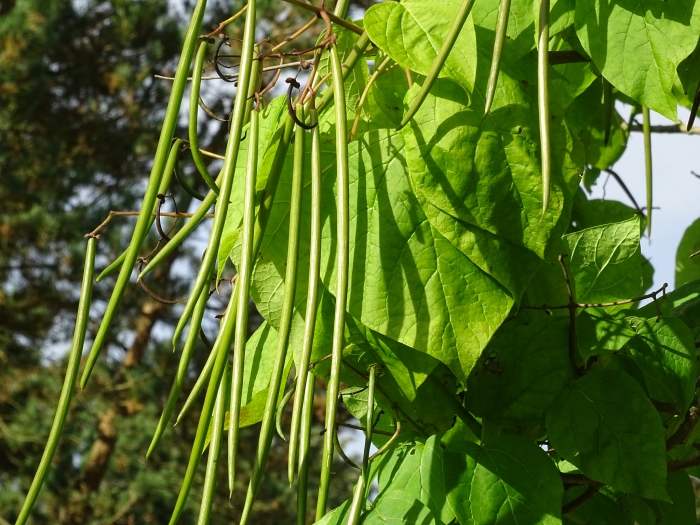Manchurian Catalpa
(Catalpa bungei)
Manchurian Catalpa (Catalpa bungei)
/
/

Olive Titus
Public Domain Mark 1.0
Image By:
Olive Titus
Recorded By:
Copyright:
Public Domain Mark 1.0
Copyright Notice:
Photo by: Olive Titus | License Type: Public Domain Mark 1.0 | License URL: https://creativecommons.org/licenses/by-sa/2.0/ | Uploader: olive.titus | Publisher: Flickr |


















Estimated Native Range
Summary
Catalpa bungei, commonly known as Manchurian catalpa, is a deciduous tree native to woodland areas and forest margins in China. It typically grows to a height of 12-25 feet (3.6-7.6 meters) and a width of 12-18 feet (3.6-5.5 meters). The Manchurian catalpa has a compact, rounded form with large heart-shaped leaves that provide dense shade. It produces showy inflorescences of white flowers with yellow and purple markings in late spring to early summer. The flowers are arranged in a corymb and are densely spotted with pink, adding to its ornamental value. After flowering, it bears elongated, slender seed pods that persist into winter, adding further interest.
Manchurian catalpa is valued for its showy flowers and compact size, making it suitable for small gardens and urban landscapes. It is also used as a street tree and in parks. This species is relatively low-maintenance, requiring full sun for optimal flowering, medium water, and well-drained soils. It is adaptable to various soil types but prefers those that are fertile. While it is not commonly known for significant disease or pest problems, it can be susceptible to verticillium wilt and should be monitored for leaf spot and catalpa sphinx moth infestations. In some regions, it may be considered invasive, so gardeners should check local guidelines before planting.CC BY-SA 4.0
Manchurian catalpa is valued for its showy flowers and compact size, making it suitable for small gardens and urban landscapes. It is also used as a street tree and in parks. This species is relatively low-maintenance, requiring full sun for optimal flowering, medium water, and well-drained soils. It is adaptable to various soil types but prefers those that are fertile. While it is not commonly known for significant disease or pest problems, it can be susceptible to verticillium wilt and should be monitored for leaf spot and catalpa sphinx moth infestations. In some regions, it may be considered invasive, so gardeners should check local guidelines before planting.CC BY-SA 4.0
Plant Description
- Plant Type: Tree
- Height: 12-25 feet
- Width: 12-18 feet
- Growth Rate: Moderate
- Flower Color: White
- Flowering Season: Spring, Summer
- Leaf Retention: Deciduous
Growth Requirements
- Sun: Full Sun
- Water: Medium
- Drainage: Medium
Common Uses
Bee Garden, Bird Garden, Butterfly Garden, Hummingbird Garden
Natural Habitat
Woodland areas and forest margins in China
Other Names
Common Names: Bunges Trompetenbaum, Qui, 당향오동나무
Scientific Names: , Catalpa bungei, Catalpa bungei f. heterophylla, Catalpa heterophylla,
GBIF Accepted Name: Catalpa bungei C.A.Mey.